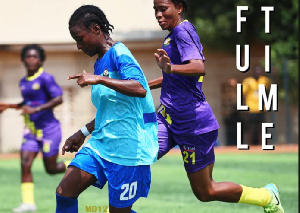Accra, March 11, GNA - Dr.Constance Bart-Plange, Programme Manager of Malaria Control Programme, Ghana, on Thursday called on the private sector to assist in bridging the gap of 6.4 million bed nets.
She said though people were buying the Insecticide Treated Nets (ITNs) its usage had been a challenge, adding, "Many have bought the nets but are not using them hence, the high increase in reported Malaria cases." Dr. Bart-Plange made the call at a press briefing in Accra as part of a three-day meeting by the United Against Malaria (UAM), a partnership of football teams, heroes, celebrities, health and advocacy organizations, governments and corporations united ahead of the 2010 World Cup to be held in South Africa in July to win the fight against Malaria.
She noted that reports from the World Health Organisation (WHO) indicated that in 2008, 33 per cent of households owned an ITN and only 19 per cent of children under five slept under an ITN the night before. The Programme Manager who outlined the numerous attempts in fighting and rolling back malaria said 2015 had been set to achieve 75 per cent roll back malaria, adding, "Though ambitious, we will achieve it with the support of stakeholders and new technologies coming up".
She called for the intensification of the campaign on the use of bed nets and explained that the programme was collaborating with the chemical sellers to train them on the dispensation and administering of the new malaria medicines to avoid misuse and development of complications. Malaria is a devastating disease even though it is entirely treatable and preventable. Half of the world population, 3.3 billion people, are at risk of contracting Malaria and there are nearly one million deaths each year.
The disease disproportionately affects people on the African continent but concentrated efforts have reduced malaria deaths by more than 50 per cent in Eritrea, Rwanda, and Zambia.
Dr. Bart-Plange noted that a comprehensive approach, including the use of mosquito nets, indoor residual spraying, and effective medicines like artemisinin-based combination therapies, could help African countries effectively tackle Malaria within their borders and across the continent to meet the UN goal of ending malaria deaths by 2015.
Dr. George Kwadwo Amofa, Deputy Director-General of Ghana Health Service (GHS) explained the four key principles in choosing the malaria medicine, which in the beginning generated confusion due to misinformation. The principles were to have scientific and chemical evidence, systematic study, scaling up impact, use of multiple interventions and community based approach.
He stated the goals and objectives of UAM with special focus on the partnership and urged journalists to help in the campaign. Mr. Leodegar Tenga, President of Tanzania Football Association and Edgar Watson, Chief Executive Officer of Federation of Uganda Football Association respectively lauded the initiative of UAM and said many footballers on many occasions could not feature in various matches "simply because they have been knocked down by malaria".
They pledged their support in the fight to ensure that Malaria, the deadly illness, which could be treated and prevented, was eliminated. UAM honoured the National Soccer team, the Black Stars for their skills in scoring against malaria.
Mr. Kwasi Nyantakyi, President of Ghana Football Association (GFA) was awarded the UAM "Golden Boot" for his exemplary leadership in guiding the Black Stars to become champions in the fight against malaria. The GFA's recent international triumphs included winning the FIFA Under 20 World Cup in October 2009, qualifying for this year's FIFA World Cup and reaching the finals of the Africa Cup of Nations held in Angola in January, this year.
In addition t o their success on the football field, the national team has been busy raising awareness about the prevention and treatment of Malaria, in partnership with Voices for a Malaria Free Future and the National Malaria Control Program. Available statistics indicated that there were 3.2 million cases of Malaria in Ghana in 2008, down from 8.3 million in 2006 thanks to a concerted effort by the government and its international partners. To reach the goal of universal coverage of Malaria prevention and treatment and to end preventable deaths from the disease by 2015, an additional 6.3 million insecticide-treated mosquito nets must be distributed across the country by the end of 2010.
If this is achieved Ghana would be well on its way to ending preventable deaths and moving closer to achieving the United Nations Millennium Development Goals, a commitment by the UN to establish peace and a healthy global economy by focusing on major issues like poverty, children's health, empowerment of women and girls, sustainable environment, disease, and development.
The UAM campaign is using the FIFA World Cup to raise awareness and drive action in tackling a disease that kills an African child every 30 seconds.
Soccer legends like Fredrick Kanoute, Kolo Toure and Seydou Keita have put their names to public service announcements on behalf of the campaign and the national football associations of Angola, Ethiopia, Cote d'Ivoire, Mali, Tanzania, Uganda and Zambia have also demonstrated their support for ending Malaria. 11 March 10
Business News of Thursday, 11 March 2010
Source: GNA












